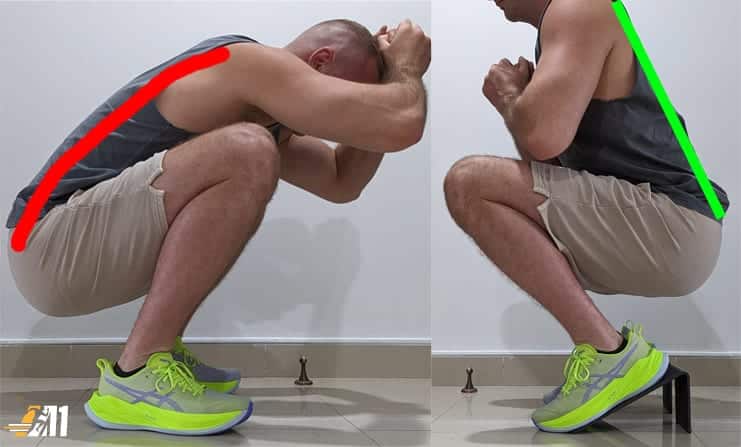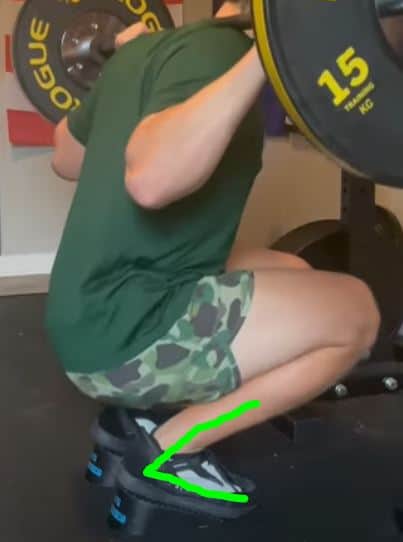Is it just me or does it seem like every man and their dog are now elevating their heels when squatting in the gym!?
Using squat wedges seems to have become incredibly popular lately – and it makes perfect sense when you understand all of the benefits squat wedges can bring to your leg day!
In this article I’m going to go through 7 reasons why you also might want to strongly consider using some squat wedges, when it makes the most sense, and we’ll also cover a couple drawbacks as well.
Let’s begin!
1. Squat Wedges Allow You To Squat Deeper With Less Discomfort
The whole point of squat wedges is to change the biomechanics of your squat, so that you’re able to reach depth more easily.

Without squat wedges, it’s extremely difficult for me to get into a full squat position because of how dodgy my knees and ankles are.
Not only is my back rounding a ton, but I’m hinging at the hips massively…
If I were to actually squat like this, I’d be getting a really good lower back workout and very little quad engagement.
Using the squat wedges allowed me to get below parallel with a perfectly straight back and absolutely no discomfort!
2. Squat Wedges Can Improve Hypertrophy & Sports Performance
If you’re looking to build massive legs like the Quadfather himself, squat wedges may actually help you with your hypertrophy goals…
Platz was well known for training using, not only full, but often extreme ranges of motion to develop the best pair of legs we’ve ever seen.
There are a couple of papers that indicate squatting deeper might better for leg hypertrophy, but more research is needed.1https://pubmed.ncbi.nlm.nih.gov/31230110/
If you’re an athlete concerned with running faster or jumping higher, there’s absolutely no debate… deep squats are superior.
Deep front and back squats guarantee performance-enhancing transfer effects of dynamic maximal strength to dynamic speed-strength capacity of hip and knee extensors compared with quarter squats.2https://pubmed.ncbi.nlm.nih.gov/22344055/
Squat wedges allow us to squat much deeper through the full range of motion, which makes them a useful tool for both athletes and bodybuilders.
3. Squat Wedges Improve Your Quadricep Development
Whenever you elevate the heel, you increase knee flexion and reduce hip flexion, making the heel elevated squat far more of a quad focused exercise.
So if you’re anything like me and have a fairly solid posterior chain, but are lacking in the quads department, elevating your heel while squatting is going to help you out massively.
4. Training With Squat Wedges Can Reduce CNS Fatigue & Allow You To Train More Frequently
The key concept here is that heel elevated squats almost completely remove your lower back from the equation…
This is important because for many athletes, especially those who have a very hip dominant low bar squat, the lower back is usually going to gas out before your legs do.
When you perform squats using squat wedges, you will likely feel virtually zero lower back involvement, which means you’re getting a pure quad burn (with some glute action too).
.
No lower back involvement means significantly less systemic fatigue, which means you can squat for longer!
On top of that, since you won’t be able to lift as much weight with your heels elevated, you aren’t likely to encounter any super heavy/brutal 3-5 rep sets where you’re left with neural fatigue lasting for days.
You probably find it much easier training legs 2-3 times a week if you’re using squat wedges!
Basically, heel elevated squats are easier for your nervous system to deal with, yet they still produce exceptional size, strength, and performance gains.
5. Squat Wedges Can Actually Help INCREASE Your Ankle Mobility
There’s a bit of a myth in the industry that squat wedges are a crutch that can reduce your ankle mobility, but this simply isn’t true…
Because you’re squatting down into such a deep “ass to grass” position, you’re actually getting a much deeper stretch through the ankles than you’d otherwise get squatting to parallel.

Squat wedges also work exceptionally well for static calf stretching, which I recommend all athletes do regularly, to keep your ankle mobility healthy.
6. Squat Wedges Can Help You Immensely With Other Exercises
Squat wedges are useful for so much more than just squatting…
The ATG split squat (and its many regressions), for instance, is made considerably easier with the addition of a squat wedge.
And it’s not as though you’re cheating by using a wedge either…
You’ll actually find better overall quad engagement when doing ATG split squats this way and so many athletes use a squat wedge even though they have amazing ankle mobility.
You can also use squat wedges for a whole host of other exercises including Jefferson curls, RDLs, Poliquin step ups, and calf raises.
If you happen to be doing the ATG training program, you’ll likely get an absurd amount of use out of your squat wedges!
Drawbacks Of Using Squat Wedges
There’s really very few negatives of using a squat wedge and I’m really having to nitpick here to come up with these…
They Take Some Getting Used To
If you’re used to doing regular low bar squats, when you begin squatting on wedges you’ll notice your knees go far out in front of your toes, which can create a bit of discomfort for some people.
I’ve found that even with horrific knee mobility, within a couple sessions I’ve greased the wheel enough that I can comfortable squat down to full depth.
Make sure you’re well warmed up before jumping onto the squat wedges.
Start out with very light (or no) weight and focus on descending slowly while keeping tension on the quads while transitioning through the amortization phase and standing back up.
.
Pausing at the bottom will help your knees get used to being in this position.
Not Ideal For Posterior Chain Development
Because the heel elevated squats are sooo quad dominant, you might find you’re no longer getting a ton of glute/hamstring/lower back activation at all…
Personally, this is a pro, not a con, because I want to build my quads and preserve my lower back for back day…
But you can also just add in a few sets of regular squats or deadlifts if this is bothering you.
Our All-Time Favorite Squat Wedges
Here at A1Athlete we’re constantly testing out new equipment so that we can recommend products which really move the needle in your training.
Recently we’ve become massive fans of the TBG Slant Ramps which are a frist-of-its-kind set of adjustable squat wedges.
These squat wedges are special because they allow you to pick the perfect incline angle for the specific exercise you’re doing.
They’re absolutely bulletproof too, so they’re a great option for anyone looking to move some serious weight!
They’re also very fairly priced.
Having tested out a bunch of the squat wedges on the market, we recon the Slant Ramps are currently the best option going!
You can get 10% off your TBG Slant Ramps using the discount code “A1ATHLETE”…
Or if you’d like some more details, check out our full review of the TBG Slant Ramps!
You might also want to check out our full comparison of the best squat wedges on the current market.
Conclusion
Ever since I started exclusively squatting with squat wedges, I’ve noticed my knees feel significantly more healthy, my lower back is less tight, and my quads are now the first muscle group to become exhausted on leg days…
If it’s your quads you’re trying to focus on, I’d strongly urge you to give a pair of squat wedges a go…
I’m almost positive you’ll prefer using them!



